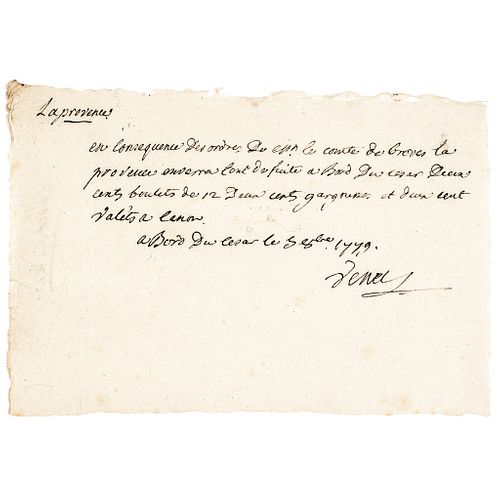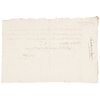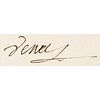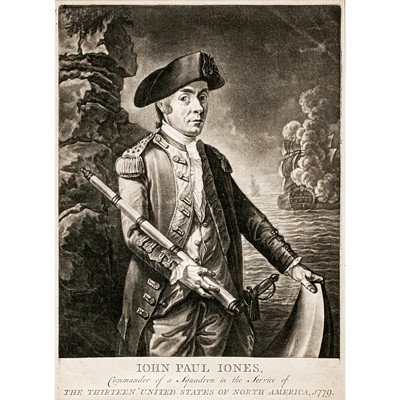September 1779 Compte d Estaing Aboard the Caesar 74-Gun French Frigate
Lot 94
Categories
Estimate:
$600 - $800
Absentee vs Live bid
Two ways to bid:
- Leave a max absentee bid and the platform will bid on your behalf up to your maximum bid during the live auction.
- Bid live during the auction and your bids will be submitted real-time to the auctioneer.
Bid Increments
| Price | Bid Increment |
|---|---|
| $0 | $10 |
| $200 | $20 |
| $300 | $25 |
| $500 | $50 |
| $1,000 | $100 |
| $2,000 | $200 |
| $3,000 | $250 |
| $5,000 | $500 |
| $10,000 | $1,000 |
| $20,000 | $2,000 |
| $30,000 | $2,500 |
| $50,000 | $5,000 |
| $100,000 | $10,000 |
| $200,000 | $20,000 |
| $300,000 | $25,000 |
| $500,000 | $50,000 |
About Auction
By Early American History Auctions
Jan 23, 2021
Set Reminder
2021-01-23 12:00:00
2021-01-23 12:00:00
America/New_York
Bidsquare
Bidsquare : Early American History Auction of Autographs, Americana, Political & Maps
https://www.bidsquare.com/auctions/early-american-history-auctions/early-american-history-auction-of-autographs-americana-political-maps-6311
311 Lots of Rare, Historic Autographs, Americana, Civil War Era, George Washington, Abraham Lincoln, Slavery & Black History, Revolutionary War Era, Colonial America, Federal Period, War of 1812, Colonial Currency, Indian Peace Medals & more... Early American History Auctions auctions@earlyamerican.com
311 Lots of Rare, Historic Autographs, Americana, Civil War Era, George Washington, Abraham Lincoln, Slavery & Black History, Revolutionary War Era, Colonial America, Federal Period, War of 1812, Colonial Currency, Indian Peace Medals & more... Early American History Auctions auctions@earlyamerican.com
- Lot Description
American Revolution
Aboard the French Brig Caesar 74 Gun Frigate Battle of Newport Period with Compte d'Estaing
September 1779-Dated Revolutionary War Period, Manuscript Document in French, Aboard the French Frigate "Ceasar," Choice Extremely Fine.
Dated September 1779, aboard the Frigate Ceasar, where orders are given from (Lt. General of the Navy, Jean-Joseph de Raflis) comte de Broves regarding supplies of fruit aboard and dividing them up for normal crew and some for the crew of the canons... Signed, document measures 6" x 8" being in exceptionally choice condition.
In 1778, the Count D'Estaing made the Delaware Capes with the following squadron of twelve ships, and four frigates, viz., Languedoc, 90 guns; Tonnant, 80 guns; Caesar, 74 guns; Guerriere, 74 guns; Protecteur, 74 guns ; Provence, 64 guns; Valliant, 64 guns; Saggitaire, 54 guns; Chiniere, 30 guns; L'Engeante, 26 guns; L'Alemence, 26 guns; L'Arimable, 26 guns. When the gale subsided, several of the ships met and fought indecisive actions. The "Dawson" met D'Estaing's Flag-ship, the "Languedoc," dismasted and with her rudder broken, fired a few shots at her and sailed away. The "Preston" met the "Tonant" and fought until night ended the engagement. The "Isis" and the French ship "Caesar," neither of which had suffered in the storm, fought hotly almost side by side for an hour and a half, when the Captain of the "Caesar" having lost his arm, abandoned the fight and the "Isis" was too much crippled to follow.
But the general result of the whole affair was that the two fleets were scattered along the coast of New England and some of the British vessels are supposed to have been driven as far south as Virginia. The British returned to New York to refit; some of the French are said to have refitted in the Delaware; but all the French vessels, except the "Caesar," which went to Boston, appear to have returned to Newport on the 20th of August.
In 1782, West Indies, in an naval attack by Admiral Rodney ,the Caesar, was the first French ship that struck, whose captain fought with great gallantry, and fell in the action ; and when she struck she had not a single foot of canvas, through which a shot had not passed, She unfortunately blew up, however, soon after she was taken, with about 200 Frenchmen, who perished on board her.
- Shipping Info
-
Early American provides in-house worldwide shipping. Please contact us directly if you have questions about your specific shipping requirements.
-
- Buyer's Premium



 EUR
EUR CAD
CAD AUD
AUD GBP
GBP MXN
MXN HKD
HKD CNY
CNY MYR
MYR SEK
SEK SGD
SGD CHF
CHF THB
THB













